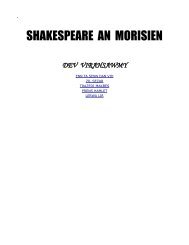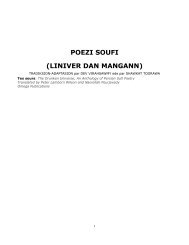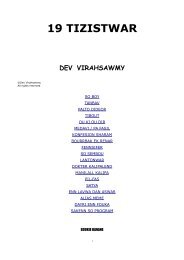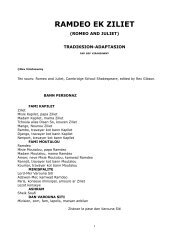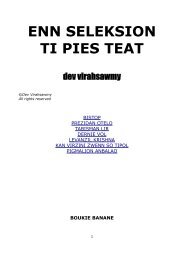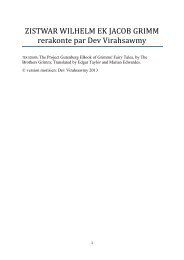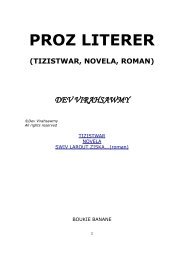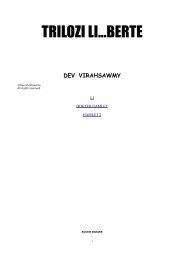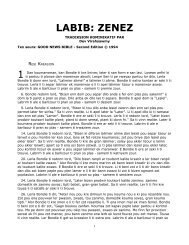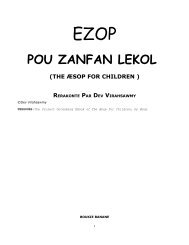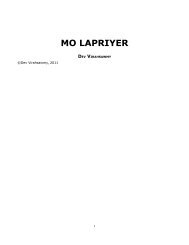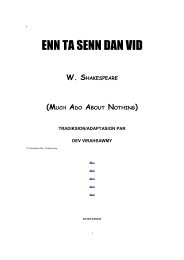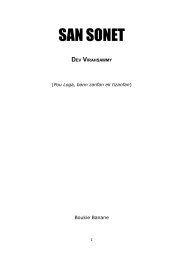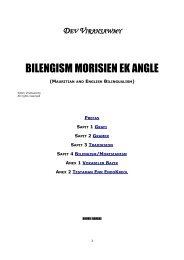LITERESI BILENG AVANSE - boukie banane
LITERESI BILENG AVANSE - boukie banane
LITERESI BILENG AVANSE - boukie banane
You also want an ePaper? Increase the reach of your titles
YUMPU automatically turns print PDFs into web optimized ePapers that Google loves.
TO READ OR TO WRITE, THAT’S THE QUESTION!<br />
Literacy is a very complex concept, specially in the world of multimedia communication. However it could be<br />
safely reduced, for the purpose of this article, to the basic skills of the 3 R’s – reading, writing and arithmetic –<br />
if the aim is to have clear ideas of some basic needs of all citizens of a given society. In this article we will<br />
assume that literacy refers to the skills of reading, writing and counting (also referred to as literacy and<br />
numeracy) provided that it is not simply construed as mechanical phonological decoding or mechanical<br />
orthographic encoding. It implies the understanding of context, the negotiation of meaning, the appreciation of<br />
tone and style and a good mastery of punctuation.<br />
WHAT IS LITERACY?<br />
In our country literacy is conceived in various ways. Some think that the mere fact of being able to scribble your<br />
name on a piece of paper makes you literate; others argue that primary schooling is a literacy benchmark;<br />
some others may think that passing CPE is a guarantee of literacy skills. In my humble submission these<br />
presuppositions cannot stand the test of scientific scrutiny. Even those who have passed CPE may not be truly<br />
literate for this test does not distinguish between marks obtained by chance (throwing the dart/pik poul) and<br />
those obtained by knowledge and reasoning; the pre-standardised cut-off/pass-mark is below 20%;<br />
competence in writing well-structured, grammatically correct sentences is in general very poor. For all these<br />
reasons we prefer the following standard: people are literate if they can write in any language a coherent,<br />
grammatically correct and reader friendly text of about 150 words in which they spell out clearly who they are.<br />
This test will only reveal whether successful candidates possess BASIC literacy or not. We must bear in mind,<br />
however, that there are higher levels of literacy such as FUNCTIONAL, ADVANCED and CREATIVE literacy.<br />
According to official figures, in the Maritime Republic of Mauritius over 85% of the population are literate. This<br />
is a gross exaggeration and the clear result of all the false premises mentioned above. We suspect that less<br />
than 50% are basically literate and less than a third are functionally literate. Advanced and creative literacy are<br />
mastered by less than 10% of the population. The present situation clearly privileges a small elite who have<br />
power and will resist change even if it is to the advantage of the great majority.<br />
WHAT IS THE PROBLEM?<br />
It is axiomatic that national universal literacy can only be achieved in the national language of a nation. Nation<br />
building implies also the development of a national language. In the Maritime Republic of Mauritius we do<br />
have a de-facto national language, Mauritian Creole, which should be henchforth known as ‘Morisien’. It is the<br />
mother-tongue, the first language (L 1 ) of over 90% of the population. If it becomes the medium of initial<br />
schooling we will dramatically raise the standard of basic literacy but monolingual literacy is for us vastly<br />
inadequate. We must aim at least at national bilingual literacy in Morisien and English. The co-existence of<br />
these two languages is bound to be harmonious and effective for both are creole languages sharing interesting<br />
grammatical features. Bilingual literacy in Morisien and English has proved very promising, rewarding and<br />
generative in both PREVOKBEK classes run by the Bureau d’Education Catholique and in Literacy and numeracy<br />
and MAK classes run by the Prison’s Training School at Mauritius Prison Services.<br />
The present policy to make children literate in 3 foreign languages at one and the same time is sheer folly. All<br />
we are doing is producing loads of semi-linguals with a smattering in two or three languages and very low<br />
mastery in any. Modern Mauritius must be bold to become a happy nation. It can only achieve happiness if it<br />
starts to get rid of presuppositions, preconceptions and prejudices which hatch ignorance.<br />
But we must stress the fact that natural and true bilingual literacy as defined above is not to be perceived only<br />
as the backbone of progressive education. It can also help in enhancing mental health.<br />
6



